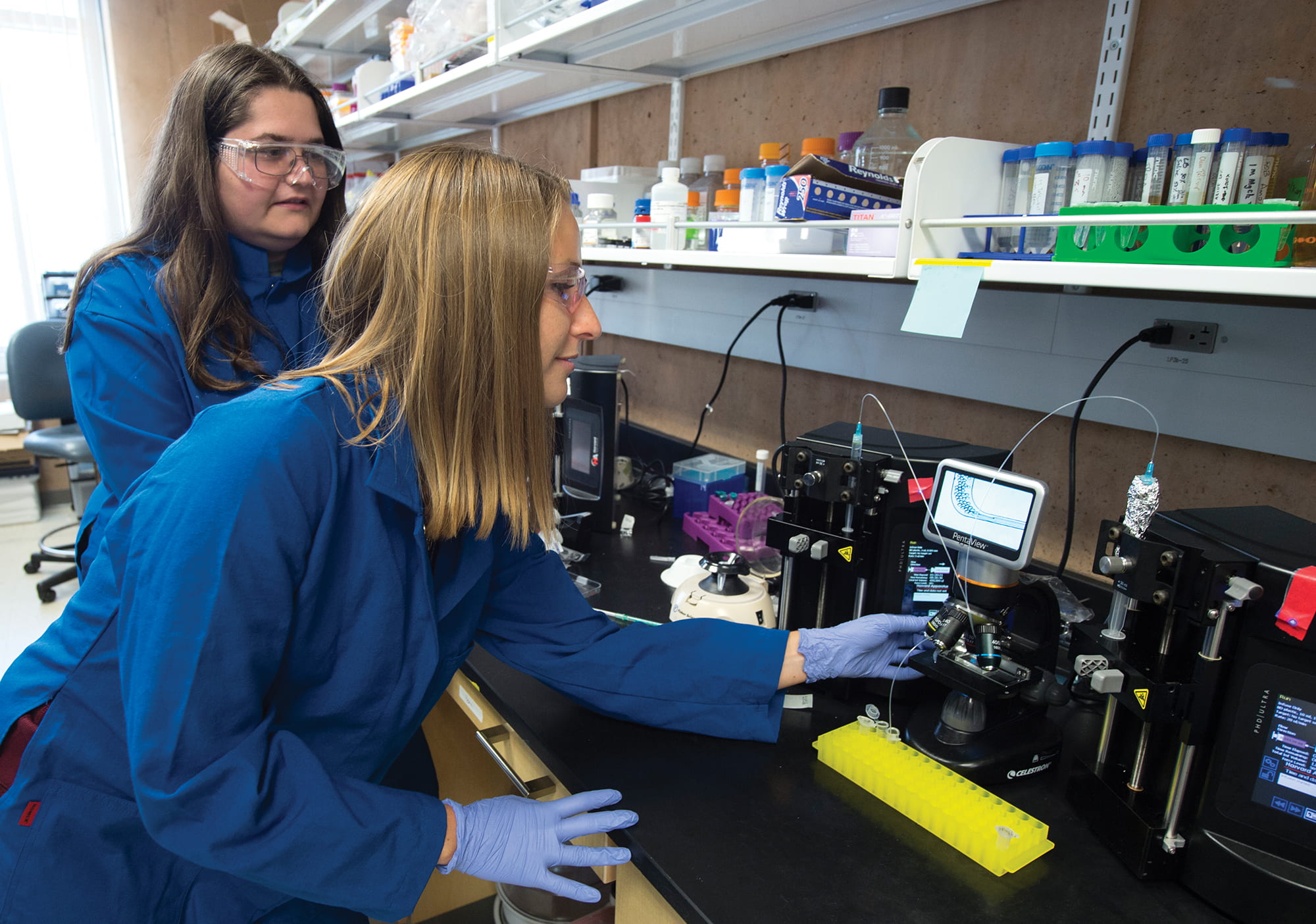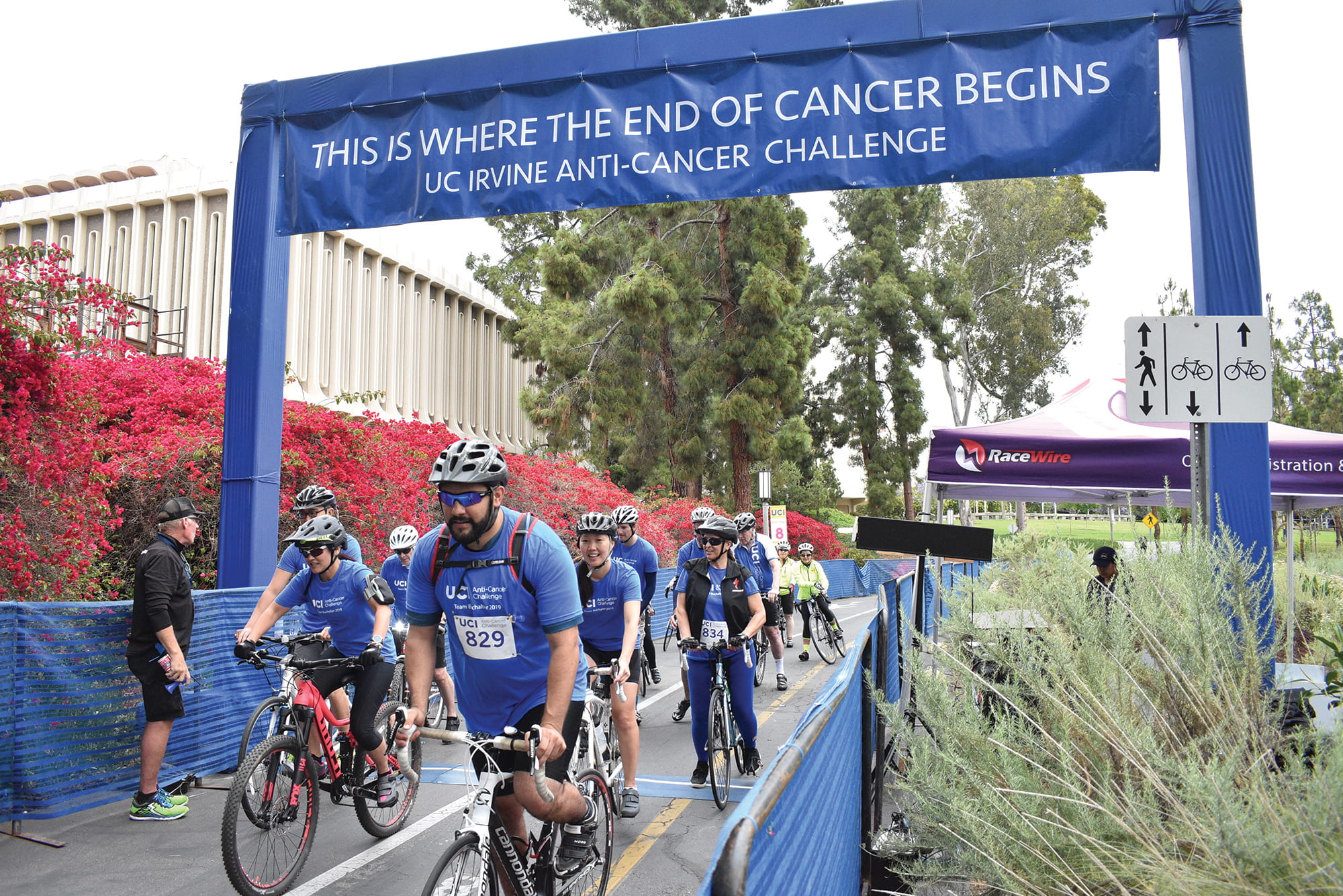Funding the Future
UCI campaign seeks to boost trailblazing research, student scholarships, healthcare advances and cultural endeavors
Inside a laboratory at UCI Medical Center, an oncologist will test a chemotherapy-free leukemia cure that harnesses patients’ immune systems to defeat the disease.
On a patch of land near the Irvine Barclay Theatre, construction crews will erect a stunning museum to house UCI’s renowned collection of California art.
In apartments and homes around the state, incoming UCI freshmen who are the first in their families to attend college will receive newly funded scholarships to help them achieve the American dream.
These and dozens of other scenarios will begin unfolding under Brilliant Future, a $2 billion UCI fundraising and engagement effort that formally kicked off Oct. 4. Billed as the largest philanthropic campaign in Orange County history, the eight-year drive is designed to transform the campus and fuel groundbreaking discoveries.
“No matter what issue you care about – climate change, health, the arts, clean energy, educating the next generation – UCI is working on it,” says Brian T. Hervey, vice chancellor for university advancement and alumni relations. “This campaign expands our capacity for trailblazing research and student success.”
It also illustrates the growing importance of private donations at public institutions across the country. At UCI, state funding accounts for about 9 percent of UCI’s annual operating budget. Some of the most creative scientific investigations and innovative buildings on campus are now powered by foundations and philanthropists.
“UCI’s mission is to change lives for the better, and a vital part of accomplishing that involves support from community partners, patients, alumni and parents who share our vision,” says UCI Chancellor Howard Gillman.
An Ambitious Agenda
Leading the charge for UCI’s Brilliant Future campaign are Jimmy Peterson, former CEO of Microsemi Corp., and his wife, Sheila, president of Beachside Books, a boutique publishing house. Both are UCI Foundation trustees. They are joined by Broadcom co-founder Henry Samueli and his wife, Susan, also a foundation trustee, who are serving as honorary chairs for UCI Health in the campaign.
As the Petersons see it, the best avenue to making a difference in the world is through supporting a university, “because that’s where the bright minds are,” Sheila Peterson says.
UCI’s stellar academics and research make it “one of the greatest resources on the planet,” Jimmy Peterson adds. “I’ve raised money for other organizations, but this campaign has more heart appeal – it’s something that benefits not only Orange County but the world.”
Encompassing everything from artificial intelligence in medicine to xylophones for UCI’s jazz program, Brilliant Future proposes an ambitious agenda for the campus. The list of priorities and projects was developed over several years in consultation with faculty, students, staff and community leaders, Hervey says.
Brilliant Future is UCI’s second comprehensive funding campaign. Its predecessor, a decadelong initiative launched in 2005, raised more than $1 billion that was used to finance pioneering autism research, establish 50 endowed professorships and create the internationally renowned Gavin Herbert Eye Institute, among other achievements.
The new campaign began as soon as the last one ended, in August 2015, but remained in a “quiet phase” until this fall. Typically, university drives don’t go public until about 40 percent of the overall target has been raised. As of Aug. 31, shortly before UCI Magazine went to press, Brilliant Future had tallied $762 million toward its $2 billion goal.

Quiet-phase donations included: a $40 million commitment from Bill Gross and Sue Gross in 2016 to establish a school of nursing; a $200 million pledge in 2017 from the Samuelis – the largest gift in UCI history – to found a new college of health sciences focused on integrative health; and two troves of artwork valued in the tens of millions of dollars each from The Irvine Museum (2016) and the estate of Orange County developer Gerald Buck (2017).
For the public phase of the campaign, UCI officials will solicit contributions toward four overarching objectives: advancing the American dream, transforming healthcare and wellness, accelerating world-changing research and exploring the human experience.
The American dream category aims to fortify UCI’s nationally recognized effort to enroll outstanding students regardless of socioeconomic status or background by providing more scholarships and support to low-income, first-generation and other underserved groups.
To revolutionize healthcare, UCI plans to expand its clinical trials and research; erect cutting-edge patient treatment centers; and pioneer a new paradigm in personalized, integrative medicine.
On the research front, UCI promises to hasten groundbreaking discoveries by opening multidisciplinary laboratories, recruiting top scientists and encouraging more cross-department collaboration.
The fourth pillar calls for exploring the human experience and reimagining creativity via arts programs; humanities research; and projects to address some of society’s most vexing challenges, such as homelessness and environmental sustainability.
Boosting Alumni Relations
The campaign also includes a parallel objective: strengthening connections with UCI alumni.
The goal is to entice at least 75,000 Anteaters – about a third of UCI’s alumni population – to attend an event, mentor a current student or otherwise engage with their alma mater, says Jack Toan ’95, MBA ’02, president of UCI’s Alumni Association. Bolstering alumni involvement can be a challenge.
“When I went to UCI in the 1990s, it was more of a commuter school, so I didn’t feel as connected to the campus,” Toan says.
A stronger alumni network would be a boon, in part because UCI graduates represent an increasing number of first-generation students and those from low-income backgrounds, who often don’t have as many social and career support systems.
Says Toan: “I would love to see more of our alumni ‘pay it forward’ on the opportunities they received here.”
That, in turn, could improve the university’s financial picture and academic prestige by boosting its U.S. News & World Report ranking, which is partially based on the percentage of former students who give to the campus.
“We invest where our hearts are,” Toan says.

Hoping to fortify emotional ties to UCI, officials are planning regional and family-focused programming, as well as virtual events for alumni to participate in wherever they may live.
And the association wants to form additional special interest chapters so that Anteaters can engage with each other based on their cultural or industry affiliations.
Reshaping the Campus and Community
The big-ticket items on Brilliant Future’s list of funding priorities include a medical center to be built on university property (bringing UCI’s innovative brand of healthcare to south Orange County), a world-class museum and institute devoted to the university’s acclaimed collection of California art, new research buildings, and naming gifts to support existing structures and programs.
Generous contributions are also being sought to create endowed faculty chairs and scholarships, improving the university’s ability to recruit top professors and students.
Together, such donations promise to transform the campus physically and academically. “They will also widen UCI’s beneficial impacts for Orange County and beyond,” says campaign director Karen Isble, associate vice chancellor for university advancement.
Because nine out of 10 UCI graduates stay in California, the university plays a critical role in the state’s economic well-being, Isble notes. UCI is a catalyst for research and entrepreneurship that create jobs and pay off exponentially, she adds.
And the Brilliant Future campaign will enable the university to multiply that payoff in ways large and small. As Joshua Grill, director of the renowned UCI Institute for Memory Impairments and Neurological Disorders, puts it: “We are at the forefront of finding solutions, but we need the help of the community to make these promising studies as successful as possible.”



